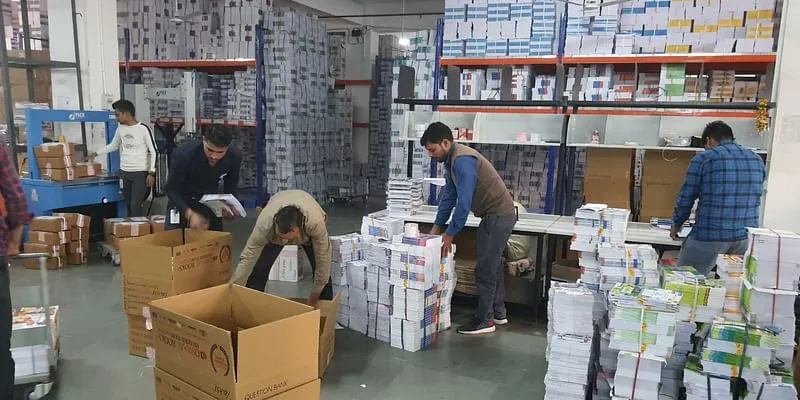How 37-year-old Oswaal Books tapped technology and launched a digital platform to grow amid COVID-19
Agra-based Oswaal Books was founded in 1984 by Naresh Jain. Amid the COVID-19 pandemic, it rolled out Oswaal 360, an online test prep platform that has onboarded around one lakh users since then.
The education sector in India underwent a massive shift with the onset of the COVID-19 pandemic. As offline activities came to a halt, schools and other institutions had to quickly shift to the online mode. The sector thrived despite the crisis due to the presence of digital tools.
Keeping this in mind, SMBStory spoke to entrepreneur, Prashant Jain, who handles the marketing and finance verticals of Agra-based , one India’s most widely known academic publishers..
The business was started in 1984 by Prashant’s father, Naresh Jain. Over nearly four decades, the company has seen the evolution of the education sector: from books to online learning.
Oswaal Books is a dominant player in the offline space. The business has an annual circulation of 35 lakh books, which includes guidebooks for CBSE (Central Board of Secondary Education) and ICSE (Indian School Certificate Examinations) as well as for the Madhya Pradesh and Karnataka boards. It also offers material for competitive exams such as NEET (National Eligibility cum Entrance Test), RRB (Railway Recruitment Boards), and more.
Sensing that “learning will happen online”, Oswaal Books launched its test-preparation platform for high-school classes called Oswaal 360 in September 2021 on a trial basis and then officially last month. It has been able to garner more than one lakh users (nearly) since the launch, Prashant claims.
He tells SMBStory how the company sailed through the pandemic, the trend around edtech, and the evolution of the company.
Lessons from the pandemic
One and a half years of the pandemic have given Prashant a “more mature” outlook of the industry and the prevailing scenario. He says the last 18 months have shown the advantages and disadvantages of online education, “a process that would have otherwise taken 10 years”.
“We have realised the importance of physical spaces like classrooms and the fact that real learning happens when you interact with your peers. Additionally, too much screen time is causing health concerns among the parents,” Prashant says.
“COVID-19 has also outlined the benefits of online learning. For instance, it has accelerated the test-prep market.”
Prashant says online test preparation will gain traction in the future as “it is not possible for a teacher to continuously sit in front of a student to check practice papers”.
This observation led the company to launch its test-prep platform called Oswaal 360.
When COVID-19 struck, digital education saw an increase in demand. In fact, according to a report by RBSA Advisors, the Indian edtech sector is slated to reach $30 billion by 2032. Over the years, new-age edtech companies like , , , and many more have carved a niche.
Prashant believes that the motto of Oswaal books is to “make learning simple” and not get swayed by trends.
Talking about launching the platform and integrating technology in education, he says, “I have realised during my interaction with my team that this (leveraging technology) is coming from an angle of fear or FOMO (fear of missing out).”
He says that at one point they wanted to use digital means just because “everyone was doing it” and there was a fear that if they didn't, they might become extinct.
However, after brainstorming for almost a year, they came to one conclusion: “If something makes learning simpler, we will do it; otherwise not.”
Prashant says he saw the perfect opportunity in the test-prep segment and chose to take a dive.
The preparation resources come on a subscription basis, with prices starting at Rs 250 and going up to Rs 600, depending on the course type.

The inception and evolution
Oswaal Books’ journey began 37 years ago. He says his father’s family was running a separate publishing business and this encouraged his father to explore the segment.
Talking about the 1980s era, he says, “Education was picking steam because people from all walks of life were realising the value. Also, most books were being published by the government and were not in sync with consumer needs.”
This, he believes, led to the need of having some private players.
Naresh borrowed Rs 1 lakh from his friends to start the business. He started printing books at a unit in Agra and sold them to the students of Madhya Pradesh board. Gradually, it became a prominent player in the market along with the likes of S.Chand (started in 1939), with a circulation of two lakh copies per annum.
The business expanded to other streams like printing books for CBSE and ICSE boards in the 1990s.
Prashant and his wife, Swati Jain, joined the business in 2007 after returning from London. Of the view that “online is going to become big in the coming times”, they launched the company’s website the same year. Prashant’s sister Divya Jain also joined the business in the year 2017.
Selling books online since 2008, Prashant is a witness to the internet economy’s evolution. “The internet penetration was so low in those days that the only orders we got were from Bangalore and very few from Mumbai.”
From zero, the online demand for books in the overall business grew to about 20 percent until 2020. Subsequently, this number has grown to almost 45 percent in the last one year, he claims.
Reimagining the future
Going forward, Oswaal Books plans to penetrate deeper into the digital space. It is launching an app to offer preparation material for the National Recruitment Agency Common Eligibility Test (NRA CET). The app will be available in six languages — Hindi, English, Tamil, Telugu, Bengali, and Malayalam.
The move is in line with the growing demand for content in vernacular languages.
“These exams are majorly taken by the youth who reside in the hinterlands. You can’t ask them to change their language preferences just because your product is not available in their native/regional languages.”
To conclude, the future of education is going to be more advanced, personalised. But will technology be the main protagonist? And will it wipe out the offline space completely?
According to Prashant, the answer is no.
“Teachers and students want products that make teaching and learning simple.” And this is why Prashant feels that a hybrid approach — a mix of online and offline tools — will direct the future of education in India.
Edited by Affirunisa Kankudti









